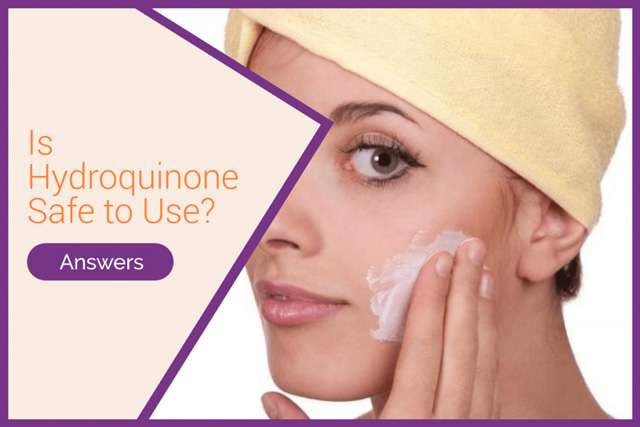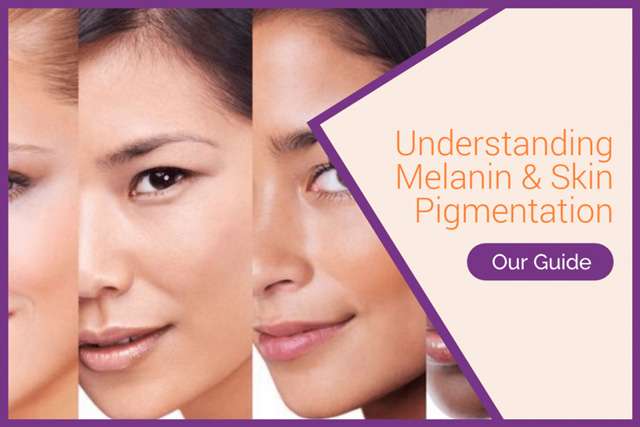Skincare Answers: Is Hydroquinone Safe to Use for Skin Whitening?

I’ve done countless reviews of skincare products that use hydroquinone as an active agent, but I don’t think it ever occurred to me to just write one comprehensive post about the chemical compound itself. At least once a week a message rolls in that essentially asks…
Is Hydroquinone Safe to Use as a Skin Whitener?
In general, the answer is yes.
The FDA and countless reputable sources of drug advice are unified about both the effectiveness and the relative safety of using Hydroquinone. In fact, the FDA has studied the drug exhaustively and allows non-prescription (over-the-counter) use at strengths up to 2% in the United States.
Please bear in mind that the testing of Hydroquinone did not seek to verify safety or efficacy in children below the age of 12. If you feel a need to use it with a child who has not yet turned 12 years old, please seek out the advice of a qualified dermatologist before reaching a decision.
Most of the controversy regarding the use of Hydroquinone seems to revolve around the choice and necessity of skin whitening, in general. Passionate advocates exist to argue for and against altering skin color (I am not one of them), and my assumption is that you’re here after making your own decisions.
This website is about examining your options for skin whitening from a safety and effectiveness viewpoint. And Hydroquinone does have a number of potential side effects and special considerations that should drive you to do some research.
Let’s Talk About Hydroquinone Side Effects Commonly Reported
First, one of the things that make it fascinating to write about skin is that everybody is truly unique. I don’t mean broad groupings like age or ethnicity, either. I mean that two people who look nearly identical can have wildly different reactions to even the simplest of skincare products.
For example, there is an entire market out there for people with sensitive skin. No one can be really sure if they belong in that segment of the market, unless they’ve experienced some sort of irritation or similar reaction when using various household beauty products.
If you have experienced irritations using a wide variety of creams or soaps, you might have some extra vulnerability when trying Hydroquinone. If you’re going to have a negative reaction with it, that will most likely happen very early on and then you might want to try one of the natural lightening solutions as an alternative.
Always apply this medicine only where there is unbroken skin, and watch carefully over the first 24 hours for any serious side effects. If you experience itching, puffiness, blotching or blisters, stop immediately and contact a doctor.
Remember that as we list out the side effects of Hydroquinone. Even though it’s available over the counter in dosages at or below 2%, it is still a chemical formulation and FDA testing has lead to some warnings.
Here’s a list of the more common (and mild) Hydroquinone side effects:
- mild burning
- stinging
- redness
- dryness
- blistering
- skin cracking
- blue-black darkening of the skin
A more serious side effect reported less frequently is an allergic reaction, potentially including:
- rash
- itching/swelling (especially of the face/tongue/throat)
- severe dizziness
- trouble breathing
The U.S. FDA did, at one point, express concerns that there might be a carcinogenic impact in using Hydroquinone at elevated dosage, but they appear to have backed away from that position.
Is it Safe to Use Hydroquinone Everyday?
Most dermatologists recommend that you stop after using it for 90 days. Their minimum recommendation is typically for a 30 day respite, but some suggest even longer.
The great worry with Hydroquinone is that prolonged use at higher dosages damages the skin permanently. The theory is that using the chemical aggressively will break down your body’s capability with regards to stabilizing its own color, and that you could eventually suffer hyperpigmentation (exogenous ochronosis) that your body can’t overcome. This is also very resistant to treatment, even by professionals.
Also, there’s a fear that prolonged use can weaken the skin, causing it to remain thin. Some dermatologists worry that this will make it easier for Hydroquinone to move throughout your body, potentially damaging vital organs.
Is Hydroquinone Safe to Use While Pregnant?
Do not use Hydroquinone while pregnant without first consulting your doctor. Research indicates that it should only be used when clearly needed, and I think we can all agree that most people using it today are not doing so out of necessity.
If you discover that you are pregnant while using Hydroquinone, discontinue it immediately, and do not resume until you been cleared by a qualified physician to do so.
Is Hydroquinone Safe to Use While Breastfeeding?
Obviously, the concern here is that any drug (Hydroquinone included) could make its way into breast milk and be harmful to an infant. Research indicates that not enough data was collected to reach a conclusion.
A quick scan of dermatology related literature indicates that you should not use Hydroquinone while breast-feeding. However, please consider consulting your doctor before you do.
How Long Does it Take to See Results?
In general, you should begin to see a lightening of the skin where the cream is applied within 3-5 weeks. It sometimes happens faster, but should not take much longer. The website drugs.com suggests that you should discontinue Hydroquinone if results are not visible after 3 months of use.
How Does Hydroquinone Lighten the Skin?
Because the term skin whitening has become so common these days, many people believe that these creams in some way bleach the skin. There’s no bleaching product, at least that I’m aware of, that has been proven safe and effective for use on skin.
At any rate, that’s not how Hydroquinone addresses problems with pigmentation. Instead, it decreases the body’s natural production of melanin. Melanin darkens the skin and so its absence means that your skin remains lighter while you use Hydroquinone.
Specifically, Hyroquinone breaks down a melanin-causing enzyme called tyrosinase, and then inhibits its ongoing production. The absence of melanin provides the whitening you desire.
As mentioned above, results are not immediate. It takes some time to create this melanin reduction, just like it will take some time for melanin levels to return to normal once you stop using Hydroquinone.
Does Hydroquinone Whitening Last Permanently?
Unfortunately, when you stop using Hydroquinone, the skin’s natural melanin level will return over time. If your period of time on Hydroquinone has been relatively short, the recovery to natural levels of melanin should also be comparatively quick.
However, if you’ve used Hydroquinone for a long period of time, or at particularly strong dosage, it’s possible that reversing the effects could take much longer. And if the concerns of some dermatologists are merited, aggressive and unsupervised use may even result in permanent discoloration.
If you discontinue use and don’t see your skin returning to “normal” appearance, set an appointment to discuss this with an experienced dermatologist.
In Summary
The research is pretty clear that the use of Hydroquinone within suggested limitations is both safe and effective. If it has one clear advantage over natural alternatives, that seems to be that it is proven to inhibit normal levels of melanin in the skin, and that’s definitely linked to a “whitening” or lightened effect.
Most users also believe that it works quicker than the natural alternatives. The question you’ll have to ask yourself, or perhaps even your dermatologist, is if these results justify the risks that we outlined above.
We are a review website, and committed to unbiased assessment of your options when it comes to lightening your skin. That means that we examine the full range of products, natural or otherwise.
In short, Hydroquinone is effective. It now has decades of scientific research to back up its claims that it will lighten your skin, but that comes with a certain risk of side effects just like most other drugs on the market.
Also Read: How to Quickly & Easily Remove Stretch Marks on Breasts
Probably the best advice we can give is to first consult a dermatologist. If that’s not practical for you, and you’ve committed to trying a product with hydroquinone, please consider starting slowly and following the guidelines that limit how long you continue to use it before taking a break.
Remember, we all love our skin and want to look our best. If lighter skin is right for you, that’s wonderful. But always make your decisions based on the longer-term impact rather than just immediate benefits.


